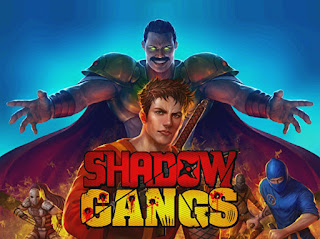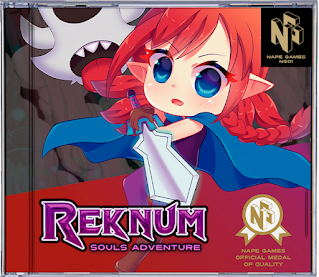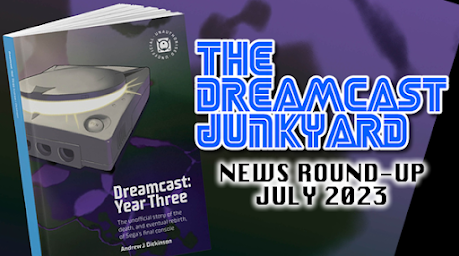How To : Get online with DreamKey 3.0
New Indies, Hardware and Mods galore! - Dreamcast News Round-up August 2022
It’s August 2022 and the Dreamcast renaissance shows no signs of petering out. All kinds of talented and creative folks from across the world clearly haven’t had their fill of the little white dream machine just yet, and a plethora of projects continue to be announced left, right and centre. But how are you supposed to keep tabs on this whirlwind of activity? Don’t you worry, the Junkyard is here to report on all the latest from the Dreamcast cosmos. Buckle up for a bumper news round-up freshly sourced from our network of highly informed sleuths.
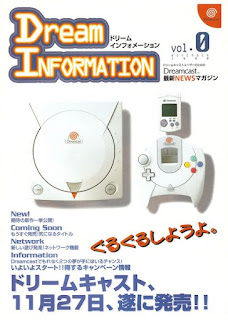 |
| Move aside 'Dream Information' the DCJY News Round-up is the only game in town now. |
Four new indie releases, Jeremy? That’s insane
In the recent past DCJY writers have salivated over the possibility that the indie release schedule of 2022 and 2023 would turn out to be ram packed. Of course, those who are a little longer in the tooth may know that announced indie games sadly don’t always make it through to completion or can fall into cycles of delays, but fortunately this has not been an issue in recent months, with four new titles landing so far this summer.
Shadow Gangs, the hotly anticipated Shinobi-esque side-scrolling beat em’ up, dropped in June. The Dreamcast release was finally made possible by a Kickstarter campaign that met its funding goal in March, after which the developers JKM Corp conspired with Wave Game Studios to rapidly turn out the physical release. Those who want to know more should check-out the publisher’s website, the handful of reviews that have quickly surfaced (The Dreamcast Junkyard, RetroFaith, Games Freezer), or have a gander at the various gameplay videos available on the likes of Youtube and Twitch.
Two further releases quickly followed Shadow Gangs in June. Hailing from sunny Spain, Nape Games made their maiden voyage into Dreamcast territory with the release of Ploid and Renkum Souls Adventure. Both are pitched as action-adventure 2D platformers, each with their own distinctive stories that appear to link-up with worlds that have already been built-up over the course of Nape Games prior releases. Relatively little has been reported on the Dreamcast releases of these two titles so far – perhaps because the initial print-runs were quite limited. The publishers have hinted that a re-print could be on the cards in the future though, so be sure to keep those eyes peeled.The final new indie release of the summer season, Mawthorne, shares a common thread with the Nape Games duo in that it was also primarily developed for the NES. Where it differs though, aside from being an entirely new IP, is in its simultaneous release on the Dreamcast and the NES. No waiting around here - the Dreamcast bound MIL-CDs shipped out alongside the cartridges in July. Details on this ‘metroidvania platform-adventure’ game can be found over on its Kickstarter page. Fingers crossed a re-print of the Dreamcast version will be coming down the line for those who missed out on the Kickstarter. As with the Nape Games duo, I can’t comment on the quality of this release, as I haven’t got my grubby mits on it, but with a bit of luck reviews will start to surface soon.More indie releases on the horizon
Of course, there are shedloads of indie releases and re-releases on the horizon too. Read on for a rapid-fire rundown of the forthcoming games:
- 240p Test Suite – $24.99, due Q3 2022. Developed by Artemio, published by VGNYSoft. “A homebrew software suite for video game consoles developed to help in the evaluation of capture cards, upscalers, upscan converters, line doublers and of course TV processing of 240p video and scaled signals.”
- Andros Dunos II - €34.90, due Q3 2022. Developed by Picorinne soft, published by JoshProd. A new side-scrolling shmup that is an officially licensed sequel to Visco’s 1992 Neo Geo game.
- Big2Small - $39.99, release date unknown. A cutesy puzzle adventure game, developed and published by RetroRoomGames, due for release on the Game Boy, N64 and Dreamcast. Pre-sales have been live since the end of May.
- Driving Strikers - £???, development due to be finished by Q4 2022. Driving Strikers does what it says on the tin. You drive about in a car striking a ball into goals. Good, old-fashioned, no-nonsense football with cars, just like your ancestors played. Of course, the game will also mark a HUGE milestone upon release as it will be the first indie Dreamcast game to feature online play. The developer Kazade has indicated that he hopes to wrap the game’s development up before the end of 2022 and has also confirmed he intends for a physical product to be produced, although a publisher has not yet been confirmed. Get hyped for full lobbies from day one.
- Flight of the Amazon Queen - $24.99, due TBA 2022. Developed and published by RetroSurge. This Dreamcast port of a classic point-and-click game has been on the cards for quite some time now. Postponements have occurred in the past, so we wouldn’t be shocked if the game doesn’t reach completion this year. Fingers crossed the details begin to be firmed up soon.
- Hermes (re-release) - $29.99/$59.99, due Q3 2022. Developed by RetroGuru, published by VGNYSoft. Many will already be familiar with this little jump n’ run game, given that it was originally released on the Dreamcast in 2017. Aside from new box art, this re-release is most notable for the Limited Edition package which features a custom green VMU.
- Metal Canary - £???, release date unknown. A promising vertical shmup developed by Titan Game Studios and Frost Byte Games, first revealed in June 2021. It seems likely that a playable demo will be made available by year-end. Follow the Metal Canary Twitter account for gameplay footage and development updates.
- Non-Casual Encounter - £???, due Q4 2022. Developed by SEGASaturno Productions, Non-Casual Encounter will be the first graphic novel indie game to be released on the Dreamcast. The prologue (demo) released in December of last year was well received, despite being very short.
- Xenocider (re-release) - $39.99, due Q3 2022. Developed by Retro Sumus, published by VGNYSoft. The impressive 3D rail shooter gets a re-release targeted at North American audiences with new box artwork.
Basically then, there are more forthcoming Dreamcast releases than you will know what to do with. Let me tell you something, the Dreamcast hasn’t even begun to peak. And when it does peak, you'll know. Because it’s gonna peak so hard that everybody in Philadelphia's gonna feel it.
Mods, hardware and other tinkerings
A slew of announcements about newly invented modifications, improved hardware, and all kinds of other productive tinkerings have been coming in thick and fast this summer. While you’ve been touring Skeggie’s penny arcades and ice-cream vans on your summer hols’, others have clearly been hard at work…
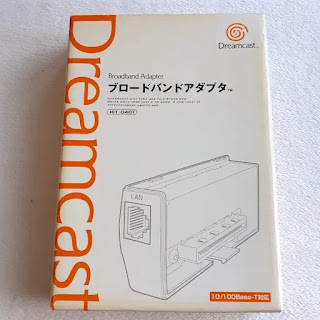 |
| Scrivani has been busy ensuring owners of the elusive Broadband Adapter can get a little more value out of their peripheral. If you have one, get it out of that dusty box and get online! |
Following on from his 2021 invention of a method that allowed Broadband Adapter users to notify others of the games they are playing via DreamcastNow, Scrivani has recently produced a guide on how to use a DreamPi (I.E. a Raspberry Pi configured to enable online play via a simulated dial-up connection) as a WiFi to ethernet repeater. In lay terms, this configuration facilitates the use of the Broadband Adapter over WiFi. So, no more trip hazards from an ethernet cable snaking down the stairs to your router. Admittedly the use of this functionality is likely to be limited, but if you are one of the privileged few who make active use of a Broadband Adapter, then you should definitely check it out.
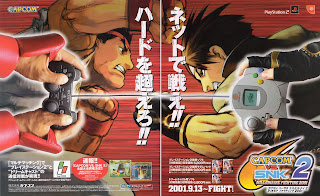 |
| Capcom vs. SNK 2 was notable for allowing cross-platform play by Dreamcast and PS2 players on the KDDI service. |
Sticking with the online theme but moving onto ground that may have a wider appeal, at the end of May, Dreamcast Talk user ‘dude22072’ revealed that they had undertaken some serious efforts to reverse engineer the online capabilities of the suite of Dreamcast games which were formerly playable online via the KDDI service in Japan. The KDDI service was what enabled a large chunk of Capcom games - including the likes of Heavy Metal Geomatrix, Marvel vs. Capcom 2, and Spawn: In the Demon’s Hand – to be played online. Given the number of games involved, this is significant progress in terms of the ongoing online revival of the Dreamcast. To be clear, the online functions of these games have not actually been restored yet, and there is no guarantee that they ever will be, but a big step forward has nevertheless been made (serious enough for the online restoration of these games to now be considered work in progress on the Dreamcast Live website).
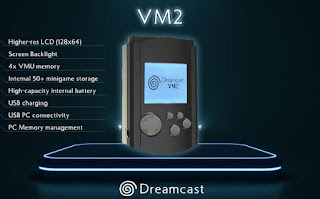 |
| No 'beeeeeep' sound from a dead battery? How can the VM2 miss this essential feature!? |
Those who don’t play their Dreamcast online (sacrilege!), don’t fear, as there is some news that may interest you too. Chris Daioglou has released an update on the progression of the creation of the ‘VM2’, a modernised Visual Memory Unit with a whole host of upgrades, including a rechargeable battery, an improved screen and a MicroSD card slot. A funding campaign for the VM2 is due to launch via Indiegogo on the 1st of September, so you won't need to wait too much longer to part with your hard earned cash. Earlier this month, 8BitMods also publicly stated their intention to produce their own VMU but have kept quiet about precisely what this will entail, given that they are only in their initial stages of development.
Last but not least
During its tragically short official lifespan, countless games were reported to be in development for the Dreamcast which never actually saw the light of day. Some of the titles that were all but complete, such as Half Life and Propellor Arena are well known, and leaked playable versions have been available for years. However, there are others that remain shrouded in mystery. Thankfully, lately pcwzrd13 has put his detective skills into action, tracking down and speaking with the developers who would have worked on these unreleased Dreamcast games, thereby setting the record straight on what was genuinely in the works and what was simply salacious gossip. He posted an extensive list of initial findings on the Dreamcast-Talk forums in May, including some quotes directly from the developers, and has been updating this on occasion since then.
 |
| The mock-up cover design for Mike Phelan's exhaustively comprehensive forthcoming guide. |
Early on in August, the Junkyard’s own Mike Phelan announced he had finally reached a cut-off point for his forthcoming tome ‘The A-Z of Dreamcast Games’, confirming that the tally of games which it will cover is a whopping 703. Hopefully this means we can stop lusting over the photos of the mock-up edition and have the real deal in our hands before the year is out. Furthermore, thanks to the selfless efforts of those who continue to reliably pump out translations – such as Cool Cool Toon which a team including Derek Pascarella has recently begun work on – a growing chunk of the Japan exclusive titles covered by the book are playable by English-language audiences.
So, that’s all for now folks. New indie releases, revived online games on the horizon, beefed-up VMUs, translations, and hefty books with as many pages as an old school Argos catalogue. What more could you want?
OK, OK, one last snippet of news, if you must insist. If you’d like to meet the Junkyard’s very-own Lewis and Tom, in person, then make sure you head to the Nottingham Video Games Expo on the 17th and 18th of December. Autographed headshots will be available but please be sure to form an orderly queue.
The Dreamcast Directory: Websites We Love in 2024
Late last year, in a gratuitous act of procrastination, I authored a piece for the Junkyard that surveyed the hefty range of Dreamcast websites that had sprung up in the console’s “post-Sega” era but which had sadly since bit the dust. In reality that piece was an excuse to indulge in some nostalgic daydreaming about the period when I first came across the console as a nerdy teen: a bizarre time when the burgeoning unofficial world (Goat Store, Beats of Rage, Treamcasts) sat alongside the last vestiges of Sega’s official involvement (idiosyncratic Japan-only shmups and surprisingly resilient online game servers).
As this list of deceased Dreamcast websites was pretty lengthy—and could have been even lengthier if not for a couple of oversights—readers could be forgiven for assuming that the hobby of maintaining websites dedicated to a 25-year old console was fading away. Fortunately though, they would be badly mistaken, and therein lies the purpose of this follow-up: to shine a light on the plethora of websites that are alive, kicking, and proudly serving the Dreamcast scene in 2024.
In no particular order, I present to you the Junkyard’s comrades-in-arms:
Dreamcast-talk (https://www.dreamcast-talk.com)
Founded in 2004, and thereby pre-dating the Dreamcast Junkyard by a year, Dreamcast-talk is undoubtedly the lodestar of the scene. The website’s founders set out to establish a forum where DC-heads of various stripes could converge to chew the fat, sans what was perceived to be the overly restrictive administrative practices of certain prior forums. Dreamcast-talk quickly achieved that goal, and has continued to do so persistently and reliably for two decades now. Theoretically it's a fairly easy gig: set out a bunch of themed boards where relevant topics can be discussed, weed out spam or egregious flaming, and undertake technical maintenance from time to time. In practice though, maintaining a forum can be a bloody nightmare, and the fact that a day rarely goes by without fresh posts being made or a new member signing up is a testament to how important Dreamcast-Talk remains. 165,348 posts made and not out: as solid an innings as you are likely to see from an internet forum. When the gold anniversary hits in 2054 I promise I’ll deliver a better present than a couple of paragraphs in a rambling blog post…DCEmulation (https://dcemulation.org)
DCEmulation is another of the scene’s OGs that is still trucking in 2024. Actually, screw that. Given that it was founded in September 2000 (!), and is by my estimation the oldest Dreamcast-focused website to grace the worldwide web today, it would only be fair to say that DCEmulation is the OG of the scene. When the historians finally turn their academic gaze to our beloved little white box, DCEmulation will probably be mentioned in every other footnote.As the name suggests, DCEmulation’s initial focus was on documenting and discussing the development of emulators designed to run on the Dreamcast. Naturally, due to the type of audience and contributors that flocked to it, this focus quite quickly broadened out to cover Dreamcast homebrew development in its entirety. A few years in, spats between admins resulted in some splitting (which is succinctly summarised by our German brethren at Sega-DC.de), but thankfully this behaviour wasn’t endemic. In fact, efforts turned from splitting to amalgamation in 2010, when DCEmulation incorporated the forum for the unofficial Phantasy Star Online server, Sylverant.
Although the DCEmulation Wiki has now been mothballed, the forum, which alongside the Simulant Discord server is home to some of the most knowledgeable Dreamcast coders out there, is still in active service after 729,068 posts. Props to [darc], Bluecrab, and the whole DCEmulation community for keeping the show on the road all these years.20 Years Of Dreamcast: The Past, Present & Future
 |
| The Dreamcast reveal at The Sega New Challenge Conference 1998 |
The Past
I think at this point most people are pretty well versed in the history of the Dreamcast. As alluded to earlier, it was launched on 27th November 1998 in Japan, and the following year in the rest of the world. Initial sales were strong, and the system had an air of technological prowess about it. Graphics were far ahead of the console competition at the time, and in some cases superior to what PC gamers were enjoying too. But it wasn't just about the graphical capabilities; as the hardware too was new, fresh and exciting. The VMU in particular turned the humble memory card into a standalone console in its own right, and the controller, while it still to this day splits opinion was interesting, with its analogue triggers and aperture for a second screen of sorts. And of course, the modem that came packaged with the console as standard (apart from some very early editions) opened the door to a whole new way of playing on consoles - against people over the internet.
 |
| Eager gamers spy a delivery of Dreamcasts on the morning of the launch |
The utterly boring debates still rage to this day about why the console failed, and why Sega decided to ditch the console after a relatively short period in the west at least (the last official game was released for the Dreamcast in 2007 in Japan); but the main reason is that many people were more interested in the PlayStation 2 and waited for Sony's new machine rather than buy a Dreamcast. Yes, there are boring debates about software support from certain publishers, and there are boring debates about the ease with which games could be pirated and the lack of a DVD player...but the main reason is that the PlayStation 2 came along and stole the Dreamcast's thunder. It happened, let's all move on.
Toy Racer Multiplayer Back Online Through Dial-Up
The good news is that Toy Racer is now back online. And while we've told you this before, this time you don't need any other additional bits and bobs to experience it. All you need is a Dreamcast and a phone line. And Toy Racer, obvs. Plug it in with the standard modem cable and point your DNS at 46.101.91.123. Viola! Toy Racer is back online via dial up...right now!
6 Dreamcast Games That Would Perfectly Suit Nintendo Switch
Anyway, this got me thinking. After Damon's rather excellent recent post about Splatoon 2 being the Dreamcast game we never knew we wanted; and after recently purchasing a Switch myself, I started to think about the other jewels in the Dreamcast's library that would make great additions to the Switch's steadily growing software suite. Sega has been a strong supporter of Nintendo hardware ever since the Gamecube and there's been a big enough length of time since the Dreamcast graced us with its presence that there are bound to be millions of Switch owners who have never played many of the system's greatest titles. Surely, with the almost mythical status the Dreamcast has garnered over the past few years, it would be a license to print money for Sega to release - either as budget downloadable games; or as a 'best of' multi-pack - a selection of the finest software ever to grace the little white box of tricks?
With this in mind, here are my picks for the best first party Sega games that would fit right in on the Switch. Please bear in mind that this is just first party stuff, so unfortunately it doesn't include a Switch port of the amazing Spirit of Speed 1937 - a game that was clearly passed down from heaven by the hand of God him/herself (delete as applicable). They'd mostly have to be re-worked with an aspect ratio more in keeping with the Switch screen too, but this is all just wishful thinking in the first place so don't go all keyboard warrior on us. Anyway, here we go...
Modern Vintage Gamer checks out the Dreamcast BBA
The current trend of Dreamcast games being brought back online shows no sign of slowing down (in some cases, totally new online games are being developed for the console); and if you have a DreamPi and a selection of online-enabled titles then you have no reason not to get fully involved. Just go to Dreamcast Live and follow the instructions and you'll be fragging, slam dunking, and racing with single analogue-sticked cramp in no time flat.
But what of the previous, more contemporary methods of connecting a Dreamcast to the world wide web? Those 33k and 56k modems may be a little dormant these days, but the Dreamcast Broadband Adapter is still quite operational with a modicum of effort, and YouTuber Modern Vintage Gamer (MVG) has done a deep dive into BBA game compatibility and web browsing functionality in 2022:
I've been a fan of MVG for some years now, his dulcet tones effortlessly deciphering even the most complicated of topics when it comes to many aspects of gaming and game development. In short, the man is a something of a genius (this is not a paid post, I should add).
So yeah, even though MVG in no way needs a boost from this inconsequential little blog to help his astronomical viewing figures, I thought it might be nice to share his video here in case you somehow missed it. Also, if you dive into the comments over on YouTube, you'll spot some familiar names from Dreamcast-Talk and the wider Dreamcast community. Lovely stuff.
Scraping the Bottom of the Barrel
 |
| Damn you Mike Phelan! |
An Interview With Bernie Stolar
DCJY: Hi Bernie, firstly let me just say how much of an honour it is to have you grace our site with your virtual presence! As huge fans of the Dreamcast, it’s quite awesome to have the opportunity to speak with you first hand. Never did I think way back in late 1999 when I picked up my first Dreamcast, that in 20 years' time I'd be conversing with the man who helped create the console!
Bernie Stolar: No problem, thanks for asking me. I consider it an honour that a product I helped create still has a loyal fanbase to this day. Thank you for keeping the 'Dream' alive.
 |
| Bernie delivering the Dreamcast keynote at GDC 1999 |
I was President and Chief Operating Officer at SEGA of America from July 1996 to August 1999. I was hired by SEGA of Japan CEO, Hayao Nakayama. I conceived the idea of Dreamcast and hired Peter Moore, Chris Gilbert, and the entire product development team.
You were at Sega of America from 1996 to 1999, all the way through the Dreamcast’s most important and formative years - can you recall the very first time you heard the name ‘Dreamcast’?
I believe it was called 'Dural' and later 'Katana' at one point. I want to say May of 1998 was when I first heard the term 'Dreamcast.'
On the topic of the early days of Dreamcast, can you recall which came first - Dreamcast or NAOMI? Or were they developed in tandem?
 |
| Early Dreamcast concept designs |
I believe SEGA of America wanted the 3Dfx version and SEGA of Japan wanted the NEC PowerVR. Both made sense for different reasons. With 3Dfx, there were more resources and documentation available for development in the US and Europe. That and it was understood that development would be easier, especially for PC ports. The NEC PowerVR made NAOMI ports simple and was easy to program, however, it was not as well supported (yet) in the US. I doubt Model 3 games would have worked too well on either. Although there was a PowerVR chip shortage when the Dreamcast launched in Japan, both chips had their pluses and minuses. In the end, I'm not sure it would have made too much of a difference.
Famously, you moved from Sony’s PlayStation division to work with SEGA of America in 1996. You're quoted in a VentureBeat interview as stating that the Saturn needed to be killed off as soon as you arrived. What were your initial thoughts on the fledgling successor to the Saturn? Did you envisage that the Dreamcast would become a huge success based on the hardware specs?
When I went to SEGA, they needed a new hardware system because the systems that they had were not selling – all eight of them. Saturn was not being supported by SEGA the way it should have been. When I showed up, it was my idea to develop a new hardware system that had the ability to play online. Before signing with SEGA, I racked my brain on a way to salvage Saturn, but it was just too far gone and too expensive and difficult to develop for. SEGA was nearly bankrupt, they needed a new console and they needed it quick. The only options were to go big or go home.
The Games That Never Were: Episode 8
Back to the matter at hand though. The Games That Never Were is a series focused solely on the multitude of games that were promised for Sega's final console but were never released for public consumption. As Pcwzrd explains in the intro, there were a staggering number of projects in the works when the plug was pulled on the Dreamcast and many of these were either switched to other platforms or simply cancelled and lost to the fiery mists of development hell, never to be seen again.
 |
| Hellgate. Image credit: Unseen64 |
TR Fight Stick Opens 'Dreamcase' Metal Shell Pre-Orders
It's worth bearing in mind that your Dreamcast needs to have been modded with a GDEMU or similar device before stuffing it inside the Dreamcase, as there's no way to play GDs once the shell replacement has been completed. Well, without taking the lid off again...which defeats the object somewhat.
The design will probably divide opinion as it makes the Dreamcast look more like a small form PC than an actual Dreamcast, but for those who want to give their console the ultimate visual makeover, this could be just what you are looking for. Some of the info listed on the TR Fight Stick website includes:
- Blue Backlight (Homogeneous)
- Compatible with GDEMU and DCHDMI
- New Technology DC 12V Mini Power Supply
- Extender PCB for SD-Card
- Game Swap Button for GDEMU
- Compatible with 56K Modem and DreamPİ
- 40MM Silent Fan ( Noctua Supported )
- Not Supporting original GD-ROM nor USB-GDROM
- Metal Sticker with Serial Number for Each Case
Daytona USA back Online, Dreamcast: Year Three, Samba De Amigo in VR, and more! - Dreamcast News Round-Up July 2023
Dreamcast: Year Three announced!
Debug Indie Sampler, Vol. 3
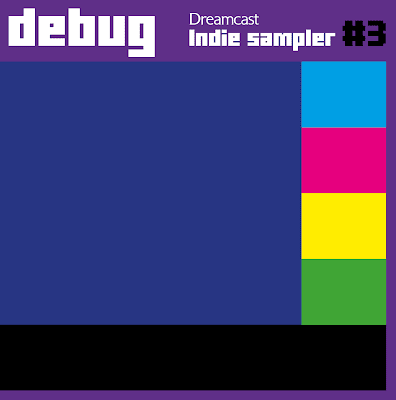 |
| This modern art is getting out of hand... |
Reinvigorating the games of old...
 |
| The King of Fighters '99 - Evolution working in VGA mode, as shown by Derek Pascarella (ateam). |
New Projects Archive Dreamcast DLC & VMU Files
 |
| Not a digital archive. |
 |
| Sites like Blue Swirl list fan-made VMU games. |
Dreamcast Collectors Unite! Exploring your collections - Part 3
So take a seat, grab yourself your favourite beverage (in a Dreamcast mug, of course) and come with us as we explore the collections of 4 wise men who go by the names of Adam, Brandon, James and Mike.
My name is Adam, better known on YouTube under "TechnicalCakeMix". I'm a Brit who has found himself in the United States for... reasons? I think?
For years I've been a fan of Cammy White, from Street Fighter - and as it turns out, she has a spin-off game of her own, called "Cannon Spike" that was exclusively on Dreamcast. While living in the homeland, I never found it for a reasonable price, and so sadly it never came to fruition - cut forward to 2014, the year I moved to the United States, and my now wife (then fiancee) gave me a huge surprise with a gift of not only my own Dreamcast console, but also a copy of Cannon Spike. From there, the rest as they say, is history.
I have around thirty games so far in my collection, which does not sound like a lot - however I've been focusing mainly on the higher $$ titles and the harder to find items before the market inevitably explodes. My eventual goal is to get as close as I can to 100% of the NA library, and also get some region exclusive oddities (some of which like Frame Gride, I already own). I've also been on the hunt for promotional merchandise, as well as oddities from the era.
A Brief History Of ChuChu Rocket! In Your Pocket
For the uninitiated, the premise of ChuChu Rocket! is simple. You place directional arrows on a checker board to guide mice (the titular ChuChus) to rocket ships, all whilst making sure they don't get eaten by giant orange cats that look like they are perpetually tripping on acid.
The guiding brainless animals to safety thing had been done eight years prior by DMA Design's Lemmings, but Sonic Team managed to take the concept and push it to the brink of madness whilst also throwing in a bonkers multiplayer mode and online play (that's still available today thanks to DreamPi). It serves as a high quality break for any Dreamcast fan who has sunk hours into deeper experiences like Shenmue or Phantasy Star Online who just wants to play something simple whilst also having an absolutely cracking time.
These days, with smart phones being in everyone's pockets, puzzle games that are easy to pick up and play function as perfect time wasters on a morning commute or even when we just can't be bothered to do anything else. Sadly, as I'm sure many of us can all agree, the vast majority of smartphone puzzlers are trite, micro-transaction ridden nonsense. But what if we could take a stellar puzzler like ChuChu Rocket! and play that in the palm of our hand instead? That would make perfect sense, right? Well it turns out that Sega did see ChuChu's portable potential...




